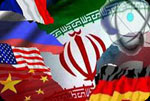 AFP: Iran and world powers met in Kazakhstan Friday for new talks seeking an elusive breakthrough on the Iranian nuclear crisis, with Tehran defiantly insisting its rights must be recognised. By Dmitry Zaks
AFP: Iran and world powers met in Kazakhstan Friday for new talks seeking an elusive breakthrough on the Iranian nuclear crisis, with Tehran defiantly insisting its rights must be recognised. By Dmitry Zaks
 ALMATY, Kazakhstan (AFP) — Iran and world powers met in Kazakhstan Friday for new talks seeking an elusive breakthrough on the Iranian nuclear crisis, with Tehran defiantly insisting its rights must be recognised.
ALMATY, Kazakhstan (AFP) — Iran and world powers met in Kazakhstan Friday for new talks seeking an elusive breakthrough on the Iranian nuclear crisis, with Tehran defiantly insisting its rights must be recognised.
The decade-old nuclear dispute has left the Islamic republic’s economy badly hurt by UN sanctions and Tehran risking military action from its arch foe Israel.
At stake at the two-day talks in the Kazakh mountain city of Almaty will be whether Iran is ready to accept a series of demands that the powers presented at the last such negotiations at the same venue in February.
Those talks ended with unusual expressions of cautious optimism from both sides, with Iran describing that meeting as “positive” and the world powers more cooly as “useful”.
But chief Iranian negotiator Saeed Jalili was in defiant mood going into the new round of negotiations, indicating that Tehran had no intention of giving ground on the key concession demanded by the West.
He told the six world powers — comprised of the five permanent UN Security Council members and Germany and known collectively as the P5+1 — that Iran demanded an immediate recognition of his country’s right to enrich uranium.
“We think that they can open up tomorrow’s (Friday’s) talks with one phrase — and that is to accept Iran’s right, particularly its right to enrich,” Jalili said in a speech Thursday at an Almaty university.
The demand is inherently objectionable to the powers because Iran is prohibited from enriching uranium by the United Nations and is heavily sanctioned for its secretive work.
“We hope that in Almaty, they do not repeat the bitter experience they have gone through in the 34 years of our revolution and that they make the right conclusion this spring,” he said referring to the 1979 Islamic revolution that ousted the shah.
Jalili also appeared to downplay the chances of his one-on-one meeting with chief US negotiator Wendy Sherman — talks Washington has been seeking for years.
“What our nation is expecting is for the US to correct its behaviour, and not in just words, and tomorrow in Almaty they are in for another test,” said Jalili.
But his deputy Ali Bagheri promised a real effort from Iran to find a workable solution in Kazakhstan.
“We are entering the talks with specific and path-clearing proposals,” he told reporters.
Failure could prove costly to both sides. A possible war would likely see a global spike in oil prices and draw in other regional powers at an already unstable time in the Middle East.
Israeli Prime Minister Benjamin Netanyahu for one warned this week that “we cannot allow” the talks to drag on indefinitely while Iran continues to pursue enrichment.
The P5+1 grouping is particularly concerned about Iran’s enrichment to levels of up to 20 percent and the Fordo fortified bunker where such activity is conducted.
They also want Iran to ship out its existing stockpile of 20-percent enriched material.
Iran denies it is developing the atomic bomb and argues that it needs its nuclear programme for peaceful medical and energy needs.
The powers proposed in February that Iran shutter the Fordo reactor and in exchange receive small concessions that hold out the hope of greater ones if it made a bigger step.
Iran has reportedly been offered the right to deal in some precious metals and perform small financial transactions now prohibited by international sanctions. Teheran has already called this approach unbalanced.
But a senior US administration official said the proposal on the table now was “balanced and very fair.”
“We hope Iran comes prepared and makes a concrete and substantive response” to a package proposed in February.
EU foreign policy chief Catherine Ashton — who is the lead P5+1 negotiator — said she was going into the meeting with “cautious optimism”.
UN Secretary General Ban Ki-moon said in Madrid it would be on the Iranian side to prove that its “nuclear development program is for peaceful purposes”.


